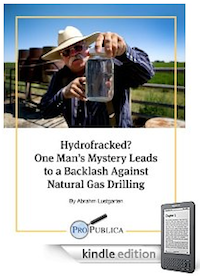 I wrote a couple weeks ago about ProPublica’s experiment with the Kindle Single format of story distribution. The sales of “Pakistan and the Mumbai Attacks: The Untold Story” seemed to offer some decent, if early, news for long-long-form journalism: After two weeks of availability in the Singles Store, the story had sold 1,900 copies — at $0.99 a pop. Three weeks in, it had sold around 2,500 copies. As of today, 34 days after launch, ProPublica general manager Richard Tofel told me, the story has sold some 3,500 copies.
I wrote a couple weeks ago about ProPublica’s experiment with the Kindle Single format of story distribution. The sales of “Pakistan and the Mumbai Attacks: The Untold Story” seemed to offer some decent, if early, news for long-long-form journalism: After two weeks of availability in the Singles Store, the story had sold 1,900 copies — at $0.99 a pop. Three weeks in, it had sold around 2,500 copies. As of today, 34 days after launch, ProPublica general manager Richard Tofel told me, the story has sold some 3,500 copies.
For a 13,000-word piece of investigative journalism, that’s not bad. (Not a business model, but not bad.) But “Pakistan and the Mumbai Attacks” isn’t the only ProPublica title available as a Kindle Single. Late last week, the nonprofit outlet added another story to the Kindle Singles marketplace: Abrahm Lustgarten‘s “Hydrofracked? One Man’s Mystery Leads to a Backlash Against Natural Gas Drilling.”
The story is, like its Kindled counterpart, deeply reported and lengthy (nearly 14,000 words). It has one key difference, though: It’s completely free. Not only is “Hydrofracked,” like “Pakistan,” available for free on the ProPublica website; it’s also free on the Kindle itself, a first for Singles. The only cost is the click of a button.
The decision to go free was Amazon’s, Tofel told me. “Their position is that because the story is free on our site, they shouldn’t charge for it.” (Ironically, Amazon also sells a Kindle version of propublica.org at a current cost of $0.99 a month, just as it sells a version of niemanlab.org — both of which are obviously free on the web. Amazon controls pricing on Kindle blogs and doesn’t let publishers distribute them for free.)
The change seems to reflect an update to Amazon’s direct-publishing pricing policy that took effect on February 21, 2011 (emphasis ours):
From time to time your Digital Book may be made available through other sales channels as part of a free promotion. It is important that Digital Books made available through the Program have promotions that are on par with free promotions of the same book in another sales channel. Therefore, if your Digital Book is available through another sales channel for free, we may also make it available for free. If we match a free promotion of your Digital Book somewhere else, your royalty during that promotion will be zero.
In other words, platform agnosticism for pricing: If it’s free on the web, Amazon will have the authority to make it free on the Kindle. It’s reminiscent of Apple’s recently announced iPhone/iPad subscription plans, which require pricing parity for all subscriptions sold, whether the transaction goes through Apple or not.
I reached out to Amazon to learn more about their thinking on that, particularly since a $0.00 price affects its bottom line, as well; I’ll update this post when I hear back. It’s worth noting that this new pricing parity applies only to Kindle books sold under Amazon’s 35 percent royalty program, which is most often used on books $2.99 or cheaper. Some ebook publishers, like author Marion Stein, have already been affected by Amazon’s power to turn paid books free.
For ProPublica, to make a bit of money despite a cost-less Kindle Single, “We’re experimenting with ways to permit people to make voluntary donations when they read the stories,” Tofel says. “And Amazon is trying to engineer a solution on that.”
Meanwhile, ProPublica’s download numbers are noteworthy. After less than a week of availability, “Hydrofracked” has clocked in around 4,500 downloads, Tofel told me — a significant bump from the numbers posted by “Pakistan and the Mumbai Attacks.” It’s hard to know for sure why that is — the “it’s free” aspect surely had a lot to do with it, but there’s also the fact, Tofel notes, that natural gas drilling got a lot of buzz this weekend, by virtue of both a long piece on the front page of yesterday’s Times and an Oscar nod for the documentary “Gasland.” It’d be great — for data purposes, anyway — if Amazon were to enable publishers to experiment with price-based A/B testing to see how much difference, in the Andersonian sense, the stretch between $0.00 and $0.99 actually makes when it comes to Kindle Singles.
Then again, for ProPublica, anyway, the price isn’t really the point. “It’s not about the money; it’s about finding new audiences,” Tofel notes. And in the first month of its experimentation with the Kindle Singles platform, ProPublica has garnered around 8,000 total downloads. That alone is a stat, he says, that “we consider to be very good news.”